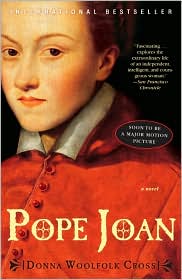Pope Joan
 I didn't hate Pope Joan. I appreciated the rich world the author created—a product of years of research—and it seemed valuable to immerse myself and really imagine what the Middle Ages might have been like. Too, the legend of Pope Joan, several hundred years ago assumed true and as widely known as King Arthur, had faded from our view and deserved to be resurrected. The legend of a female pope is definitely great story material. Plus, this book kept me turning pages.
I didn't hate Pope Joan. I appreciated the rich world the author created—a product of years of research—and it seemed valuable to immerse myself and really imagine what the Middle Ages might have been like. Too, the legend of Pope Joan, several hundred years ago assumed true and as widely known as King Arthur, had faded from our view and deserved to be resurrected. The legend of a female pope is definitely great story material. Plus, this book kept me turning pages.But I did sometimes feel manipulated. It had too much soap opera flavor for my taste, with romance drama and battle drama and intrigue drama. And way too much deaux ex machina. I couldn’t resist reporting my disgust to Eric every time another unbelievable coincidence came along, and I started keeping a log of them at the front of the book. I wasn’t a big fan of the ending either—again, things came together too perfectly.
I thought Joan and Gerold (her life-long love) were both overly perfect too (as opposed to just the right amount of perfect . . . ). They needed flaws, and the flaws needed to cause some problems. Joan's only supposed flaw was her stubbornness in sticking to what she believes is right, and that doesn't count. We're supposed to admire her courage. If it causes problems, it's because other people are stupid, bigoted, whatever. And Gerold had no flaws whatsoever. Lame.
On the other hand, the book did inspire a good discussion about the power of education. The author says, “I wrote this book with my own daughter, and all the daughters of the world, very much in mind. If, as I hope, this story inspires young women to cultivate their minds and pursue their education, to follow their own dreams wherever they may lead, then Joan's legacy is secure.” In sharing this message, the book definitely succeeds.
Pope Joan also got our group talking about women. One person brought up how the book has no positive female characters other than Joan, and we talked about how Joan had to become a man to gain power. Someone else asked if Joan was really true to herself by giving up all her femaleness, comparing her to Martha Ballard in A Midwife’s Tale, who found real power in her community and family through her talents and her femininity. (Of course, things were a lot more open for women by then.) We also talked about how our modern culture still buys into the idea that real power is in being like men.
So . . . the book immersed me in the Middle Ages, sparked a very lively discussion, and kept me turning pages, but lots of stuff drove me crazy.



2 Comments:
Hey Ched. I read Pope Joan a while ago but had forgotten about it - thanks for reminding me. Yes, the female pope made great story material, but I remember a lot of similar eye-rolling things about the book that you mention. Overall I was intrigued by the story and the general message, and so it was one of those books that I thought and talked a lot about while going about my day.
I agree. It did provide lots to think about. That's why it made a great book group discussion. Thanks for reading my review and commenting. :)
Post a Comment
<< Home